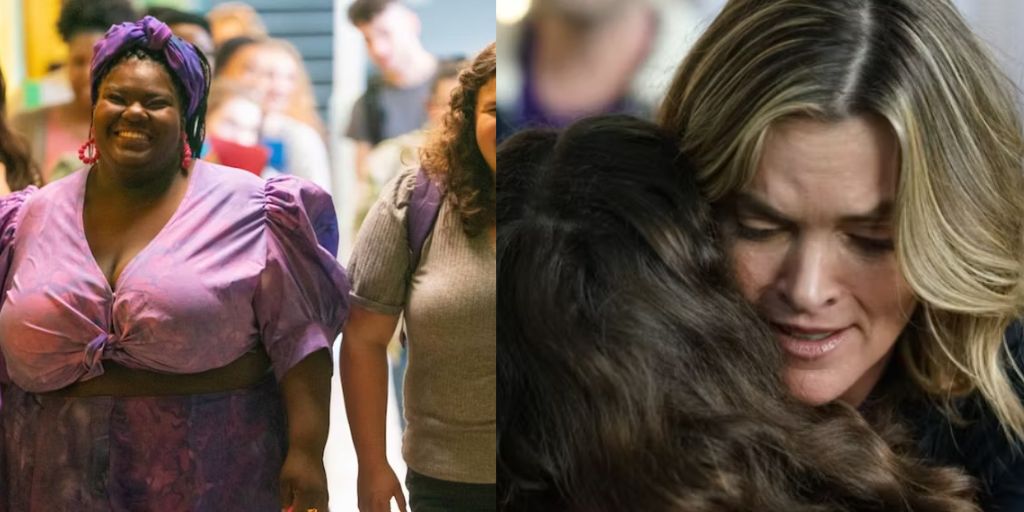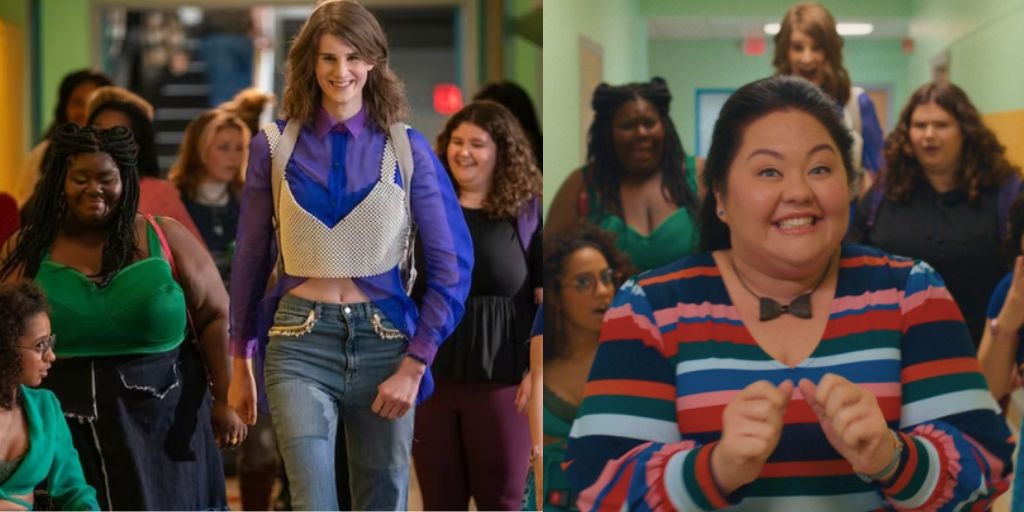Wayfarer Studios and American High have done a great job providing quality teen entertainment in recent years.
I enjoyed films like Five Feet Apart and Clouds from Wayfarer, and Crush and Plan B from American High.
So, when I saw both logos at the start of Empire Waist, I felt excited. I was pleased to find that the film adds positively to both companies’ collections.
What Is ‘Empire Waist’ About?
Empire Waist tells the story of Lenore (Mia Kaplan), a teen girl who feels invisible at school and prefers it that way.
She is bigger than most of her classmates, making her a target for bullies like the mean girl Sylvie (Isabella Pisacane). Instead of trying to make friends, Lenore stays safe by embracing her loner status.
She avoids eye contact and spends her time sketching outfits. Her home life is not easy either. While her quirky dad (Rainn Wilson) is supportive, her mom (Missi Pyle) is always working out and dieting, putting pressure on Lenore to follow suit.
Lenore’s life changes when she partners with Kayla (Jemima Yevu) for a class project. Although Kayla is also plus-sized, she does not hide anything about herself.
Confident and charismatic, Kayla helps Lenore come out of her shell and encourages her to enter a competitive fashion design showcase.
They gather the school outcasts as models, including the queer and disabled Marcy (Daisy Washington), shy and petite Diamond (Kassandra Tellez), and trans tall girl Tina (Holly McDowell).
Despite their differences, they all struggle to find clothes they like that fit. Lenore helps her new friends feel empowered with the outfits she makes, and in doing so, she starts to build her self-esteem.
‘Empire Waist’ Captures the Nuances of Fatphobia
As someone who has been fat and dealt with body image issues my entire life, Empire Waist impacted me deeply.
The scene where Lenore stands on the scale during her physical is more disturbing than many horror films. Many people can sadly relate to the trauma tied to that experience.
The moment when a nutritionist tells Lenore that a single slice of pizza counts as an entire serving was painful. These interactions with doctors are meant to help but can cause lasting mental harm, especially for young girls.
Kaplan delivers a touching and raw performance, tackling these hard and sensitive insecurities. She breaks your heart repeatedly as she shares her feelings of being disgusting and unworthy of nice things.

Empire Waist adds another layer by focusing on Lenore’s complicated relationship with her mother. It would be easy to show her mom as a cruel villain, but writer-director Claire Ayoub wisely avoids that route in her script and direction. Missi Pyle’s performance is genuine.
Lenore’s mother cares about her but shows it in a harmful way. She tries to protect Lenore by shielding her from the world and pushing her to change instead of accepting who she is.
This behavior comes from Lenore’s mother constantly nitpicking her own appearance, a pattern likely passed down from her own mother. This illustrates how toxic thinking can often be passed through generations.
Unfortunately, Sylvie does not have the same complexity. The mean girl is a cliché antagonist, and the attempt to explain why she bullies others feels oversimplified and lacks a satisfying end.
While much of the writing is sharp and witty, Sylvie’s dialogue feels dated and amateurish, making her character flat even as an adversary. There are ways to have fun with these roles, but Empire Waist relies too much on predictable tropes.
‘Empire Waist’ Never Loses Its Sense of Fun and Celebration
Empire Waist faces a similar issue as Prom Dates, another American High production, because it is hard to define the target audience.
Many dialogue and plot points would fit right in on Disney Channel, but there are also some edgier moments—like Kayla going into a bedroom with a boy and a revealing photo of her getting shared—that seem aimed at older viewers. The film struggles to know who it is for.
Still, there is undeniable charm in the film, no matter your age. The jokes are not always groundbreaking, but they are often funny.
Watching the actors deliver their lines is enjoyable. The entire ensemble has a delightful chemistry, bringing energy and authenticity to their roles.
Yevu stands out, bringing a special spark to her first role. Though she has less screen time, McDowell also shines as a comedic standout, delivering her quirky lines with perfect timing.
She would fit right into a movie like Bottoms. The cast is wonderfully diverse, and each character celebrates their differences without feeling boxed in or reduced to one trait. Their friendship is beautiful to watch.
The platonic love in Empire Waist is the strongest aspect, but the romantic subplot is sweet as well.
It is hard not to root for Charlie (Aric Floyd), Lenore’s supportive crush who enjoys photography and LARPing. Mrs. Hall (Jolene Purdy), the encouraging teacher, also deserves praise.
Ayoub smartly casts a plus-size woman in this role, making the dynamic even more impactful. Purdy makes the most of her time on screen, and her line, “I was gonna yell at you about that Wikipedia-ass presentation,” made me laugh out loud.
Empire Waist features a moving tribute to friendship dressed in a bright, colorful package. While it is not free from tropes and predictable story beats, it tackles body image issues uniquely and refreshingly.
This film is essential for younger viewers who can relate to Lenore’s journey, and it is healing for those who have moved on but still carry painful memories from their past.





